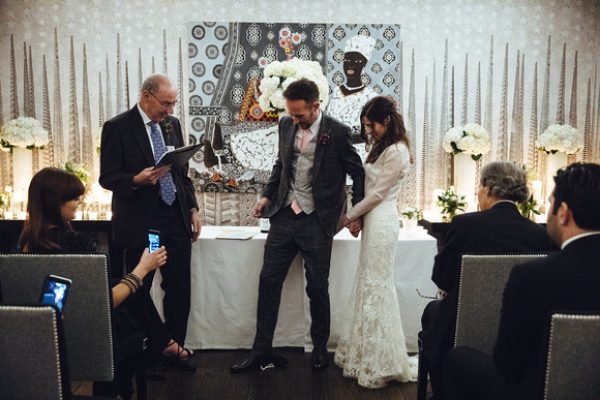
by Michael | Apr 12, 2018 | Blog
Choosing a celebrant is a bit like choosing a plumber. Without a personal recommendation, you have to go by the website – and instinct. If you get your choice wrong, it can be costly in more than one way.
So, unless you know someone who has already used the celebrant, the website is the first port of call.
Website
You will probably find some testimonials there. Take time to read at least a few. You can get a good idea about the celebrant’s service from them.
You can ask to be connected with people who have already used the celebrant’s services. That’s a good beginning.
There may be photos or videos on display. These will help you to ‘get to know’ the officiant a bit. If you’ve taken a dislike to the celebrant at this stage, don’t go any further with them. You will need to get on with and feel at ease with them – especially on the big day.
Direct contact
You should of course contact the celebrant – and arrange either a face-to-face meeting or a Skype call. That should cost nothing, so you are not committed at that stage. Following that initial conversation, you will be able to answer two vital questions:
- can the celebrant communicate well? Can they speak well and also listen well?
- do you feel a rapport with them? Are they friendly, experienced and professional?
You may have plenty of questions. That’s fine. You may want to be led by the hand and take advice every step of the way, or you may prefer to insist on all the details yourself. Usually, it’s a combination. What matters is that you are happy with the outcome.
What you need to know
You should receive clear information about the celebrant’s terms and conditions. You will need to know the celebrant’s method of working with you. Cheapest is not always best, of course, and you will have to judge what you can afford to pay.
By all means, compare a couple of celebrants. Don’t let price influence you unduly. What really matters for your special event is whether the celebrant can deliver exactly what you want. You don’t want compromise.
Ideally, your celebrant will allow you to create your perfect ceremony, guiding you clearly and inviting your full participation. He will then conduct the ceremony professionally, memorably and with warmth.
If you follow these tips, you should be sure of receiving the greatest assistance and satisfaction in the build-up to what is certainly the most important day in your life.
Guess what? Michael can help you, and is just waiting for you to contact him!
Photo: www.lyndseygoddard.com
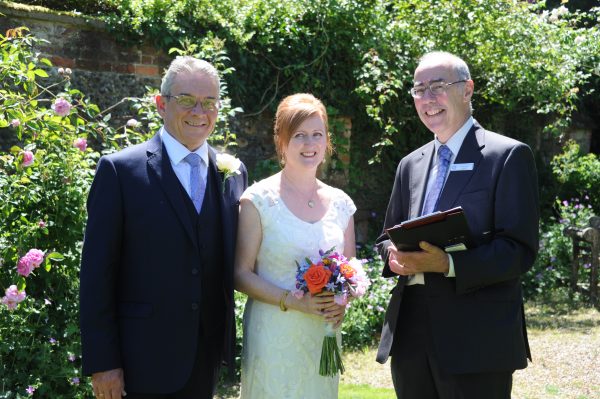
by Michael | Apr 12, 2018 | Blog
Of course, everybody wants a happy and successful wedding. But such a result does not come without careful planning.
That applies whatever your budget.
Suppliers
You will probably be using caterers, flower-arrangers, photographers, a DJ and possibly a wedding-planner and – hopefully! – a civil celebrant like myself.
It makes sense to get quotes from two or three of each before committing. Cost will matter, but should not be the critical factor (see the next paragraph). If you don’t have any first-hand referrals, look at testimonials, but definitely don’t neglect some kind of personal contact. This allows you to get to know the supplier as well as to ask questions before committing. Allow time for all this.
Depending on your budget, you should ensure you do not stint on what really matters to you. The venue, wedding dress or the catering could be the most essential component to you both. To ensure you get exactly what you want may mean reducing costs elsewhere – eg the guest-list, venue size, the flowers, etc. Just make sure you and your partner are in agreement and are not inadvertently preparing a rude shock for the other!
Saving money
Sometimes, using a less common venue (park, zoo, beach, field) can reduce your fees, but still fit the bill completely.
If you go for a wedding lunch, rather than dinner, this may reduce costs. Moreover, the season will have an effect. Summer, Christmas and Valentine’s Day can be more expensive times, for example.
Do ensure any wedding-planner, celebrant or venue knows exactly what your desires are (in good time). Make a list, and bear in mind you may want to arrange accommodation at the venue (possibly for guests from further afield as well as for you). (You might be able to negotiate a special price too!)
So, plan, plan and plan. Make notes, ask questions, take advice and build a perfect day for yourselves and your guests. Ensure you know what you really want. This will be the day when your every desire must be fulfilled!
For further help, speak to Michael!
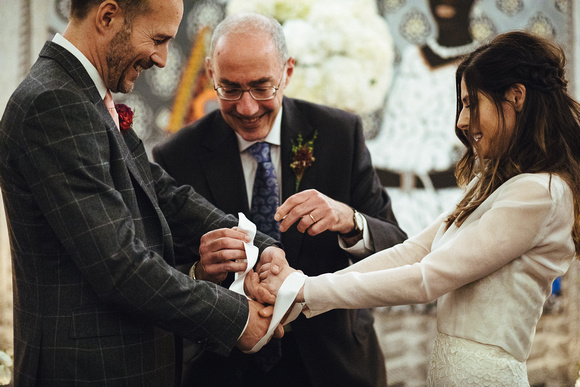
by Michael | Apr 3, 2018 | Blog
It may sound a bit bizarre that I am writing about humour at weddings. However, ceremonies like these don’t have to be solemn all the time. That’s not to say that there aren’t parts that probably should be.
Apart from making the atmosphere lighter, humour can cause the ceremony to be more personal and memorable. (Incidentally, I’m referring to intentional humour here!)
Of course, the celebrant can contribute with touches of wit (as long as he accepts that the ceremony is not a stand-up routine!). But the point is that the whole event is actually about the couple up there with him.
One area where the bride and groom can show their individuality and humour is the vows. Instead of – or in addition to – traditional vows, the couple can write their own.
These are public declarations, so should be primarily serious and sincere. However, the dose can be lightened with a spot of humour. This will help reveal the personality of the pair.
You don’t have to write masses (in fact, less is good). Quite often, the vows can be promises. Some will say what you will do; others what you won’t do. Season with a little humour.
What about a few examples of humour?
Groom: I promise not to leave my empty beer cans in the lounge overnight. I promise not to go out to the pub every night. Not every night.
Bride: I promise to learn to cook at least two different dishes by the end of next year.
Groom: I promise not to leave my shoes all over the hallway. I even promise to take my shoes off when I come in …
Bride: I promise to wait until after the wedding day to tell you what I think of those shoes.
Groom: I promise to ask a passer-by the way, if I get lost.
Bride: I promise we won’t see my parents excessively. Of course, they may visit us the weekend we’re not with them.
Groom: I promise not to clean my football boots in front of the television. I promise not to keep the take-away in business single-handed.
Bride: I promise not to cancel the Sky Sports subscription without at least a day’s warning.
Groom: I promise to allow you to go shopping at least once when we’re on holiday.
Bride: I promise to make you proud of me by buying a lovely new handbag every month or two.
Groom: I promise to look interested when you tell me about your day.
Bride: I promise to care for you tenderly if your illness is neither man-flu nor hangover-related.
You can work individually or together when writing your vows. The effects may be fascinating!
So don’t go thinking that humour is out of place at a major ceremony. It is if the humour is insulting, offensive or derogatory. Otherwise, be prepared to use it judiciously, and your ceremony may well stand out even more.
For more advice, please contact Michael
Photo: www.lyndseygoddard.com
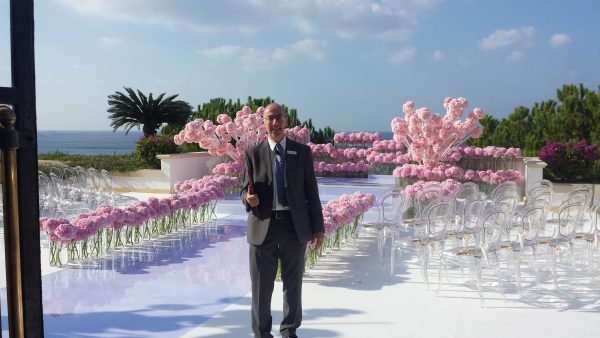
by Michael | Feb 27, 2018 | Blog
It’s obvious from my conversations with potential clients that they have some mistaken beliefs about civil celebrants. I want to tackle a few here, and put the record straight.
Let’s take three fallacies:
- “All celebrants do is turn up for half an hour on the Saturday.”
Not in my experience!
As far as I am concerned, on the day, I aim to arrive one hour before the ceremony. That way, I am able to liaise with relevant persons (event planner, groom, best man, bridesmaids, etc.) and check out the venue. The purpose is to ensure everything is in place and to reassure.
I then conduct the ceremony and, although available for photos straight after, I can normally depart then.
However, my work is not limited to the day itself!
After my initial meeting/call with the clients, which usually takes up to an hour, I follow up by sending a summary e-mail along with my Terms & Conditions. Assuming the client wants to work with me, I thank them and tell them when to expect my draft.
A considerable amount of work may go into the first draft. Guided by what the client has suggested, I put together a ceremony that is unique. It may be formal or relatively relaxed; serious or with bits of humour; religious, partly so, or totally secular. It may contain rituals. I may work with the couple to write their own vows, if they want this, and like to personalise the ceremony even more by including their ‘story’.
So there is a lot to put together, and there will normally be an exchange of e-mails before we finish up with a product every word of which the couple approves and, hopefully, loves.
Contact with the client doesn’t end there. It can be more random (especially nearing the ceremony date) and, often, there is a rehearsal to conduct.
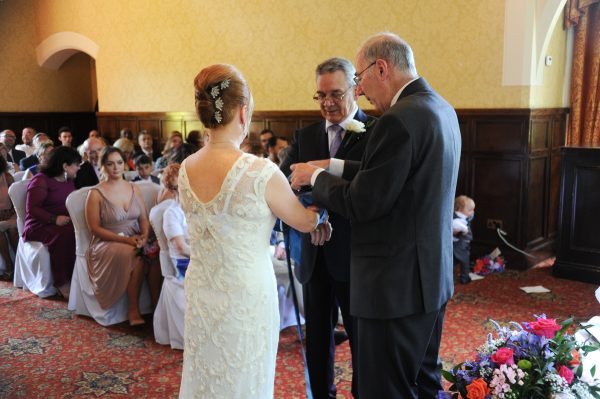
- “Anyone can do it.”
As you will see from the answer to the first question, there are a number of skills that come into play as part of the process of preparing a special ceremony.
Firstly, there are questioning and listening skills, especially during the initial interview. I need to be able to take clients to their ceremony in their imagination. Then we can focus on what they really want (and don’t want). I offer ideas (or listen to and understand those of the clients) and make helpful suggestions.
Secondly, writing skills are essential. I don’t very often write original material, but when I do, it has to fit in with the tone. Similarly, with other people’s texts or poems. It takes time to choose these successfully.
Thirdly, I have to use my experience to advise what may work in practice and what may not.
Fourthly, I have to use my experience on the day to cope with, and minimise, unexpected occurrences.
Fifthly, I need to be in control on the day and keep everybody calm.
Finally, I need to deliver a wonderful ceremony. My presentation skills must be first-rate, and I need to conduct the ceremony with skill and efficiency as well as at a human level and, where appropriate, with humour.
Many people will have many of these skills, but few will have all.
- “You’re too expensive.”
As I hope I have now shown, a professional civil celebrant has very specialised skill sets. Not many people can do such a job effectively, so there is a scarcity element.
Moreover, clients can benefit from a civil celebrant’s wide experience, not only as the ceremony is put together but also on the day.
Additionally, time and travel to get to the venue need to be factored in.
On a practical note, a good civil celebrant will belong to an Association (such as the AOIC), have full indemnity insurance etc. and be fully trained. All these are expensive items, enhance the job, and deserve to be reimbursed.
I hope I have made my case successfully – and that I shall be hearing from you!

by Michael | Jan 16, 2018 | Blog
Just imagine for a moment …
What if a full religious wedding doesn’t rock your boat?
What if the secular, standard, certificate-signing at a Register Office doesn’t excite you either?
But what if you could go to the Register Office in the morning or the day before in your jeans, with a couple of witnesses?What if you signed the marriage certificate and then enjoyed a wonderful, joyous ceremony in the afternoon with all your guests?
Because you can.
With the help of a celebrant.
As long as the legal bit is still carried out, there’s nothing to stop you holding the ceremony you actually want – at the venue you want.
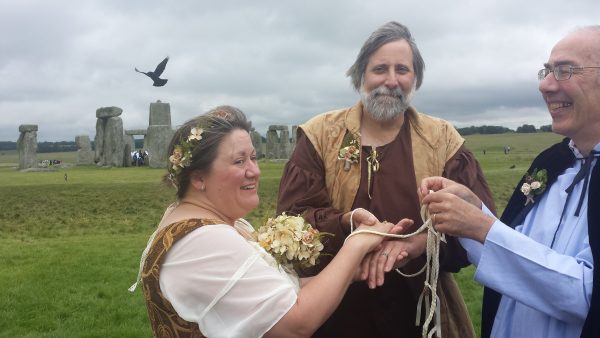
The Ceremony
One of the beauties about a celebrant-led wedding is that he or she will help you (as much or as little as you want!) to build your own ceremony. So if you want a religious component (even taken from various cultural sources), or a mixture, you can put it in; if you want spiritual elements, just go for it; poems and texts are absolutely OK. With some give and take, this way you can please yourselves AND keep your parents happy!
As well as the readings, you decide on the music. You also have the last word on the choreography (who walks or stands where), readers, the wording, and delivery, of the vows. Don’t worry, if that sounds off-putting. Your celebrant will be pleased to advise and make helpful suggestions. This process, usually conducted by e-mail, can go on over the course of several months.
Ritual
You will be able to incorporate any rituals and little touches that would not previously have been possible, if you so wish. For example, drink from a loving cup, burn a Unity Candle or have a handfasting (an ancient Celtic betrothal ritual).
Conclusion
In short, this is YOUR day, and your celebrant, who will of course conduct the ceremony for you, will do everything to ensure that the day is unforgettable, meaningful and what YOU want.
You only have to imagine (and get in touch!)!







